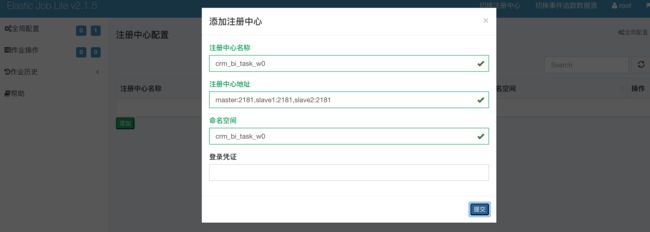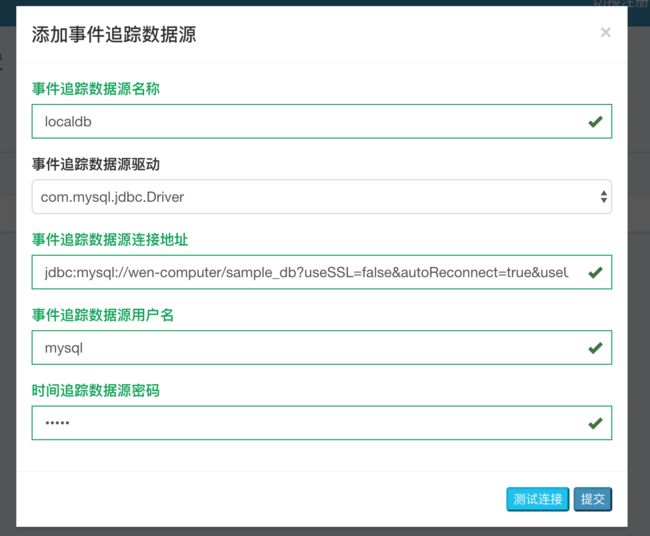elasticjob接入方式和管理端使用
1.elasticjob接入方式
1.1 加入依赖
<dependency>
<groupId>com.dangdanggroupId>
<artifactId>elastic-job-lite-coreartifactId>
<version>2.1.5version>
dependency>
<dependency>
<groupId>com.dangdanggroupId>
<artifactId>elastic-job-lite-springartifactId>
<version>2.1.5version>
dependency>1.2 实现任务逻辑
1.2.1 spring的方式
通过实现SimpleJob接口,最终会定时调用execute方法
package com.company.job;
/**
* quartz-memory-project Created by caowenyi on 2017/9/27 .
*/
@Slf4j
public class SampleJob implements SimpleJob {
@Override
public void execute(ShardingContext shardingContext) {
Stopwatch stopwatch = Stopwatch.createStarted();
log.info("开始Sample任务的运行");
String jobParameter = shardingContext.getJobParameter();
long callCostTime = stopwatch.elapsed(TimeUnit.SECONDS);
log.info("结束Sample任务的运行 任务参数={} 花费时间={}秒", jobParameter, callCostTime);
}
}
配置任务的zookeeper注册中心:applicationContext-zk.xml
参数说明:
- zk.hosts: 具体环境对应的zookeeper服务器地址。
zk.namespace:命名空间,用于在管理端区分不同的也业务方的不同环境。建议命令方式:业务方_具体环境。 如:crm_bi_task
base-sleep-time-milliseconds、max-sleep-time-milliseconds、max-retries:设置client与zookeeper连接丢失时,进行重连的策略。
ExponentialBackoffRetry(int baseSleepTimeMs, int maxRetries, int maxSleepMs) 。时间间隔 = baseSleepTimeMs * Math.max(1, random.nextInt(1 << (retryCount + 1)))
<beans xmlns="http://www.springframework.org/schema/beans"
xmlns:xsi="http://www.w3.org/2001/XMLSchema-instance"
xmlns:reg="http://www.xxxx.com/schema/ddframe/reg"
xsi:schemaLocation="http://www.springframework.org/schema/beans
http://www.springframework.org/schema/beans/spring-beans.xsd
http://www.xxxx.com/schema/ddframe/reg
http://www.xxxx.com/schema/ddframe/reg/reg.xsd">
<reg:zookeeper id="regCenter" server-lists="${zk.hosts}" namespace="${zk.namespace}"
base-sleep-time-milliseconds="1000" max-sleep-time-milliseconds="3000" max-retries="3"/>
beans>配置任务的调度信息:applicationContext-job.xml
参数说明:
- id:bean的名字
- registry-center-ref:注册中心bean
- cron: 定时调度的cron表达式
- sharding-total-count:任务切片数量。一般只需要设置为1
- sharding-item-parameters:任务分片参数。使用0=A即可。
- description:任务的用途描述
- event-trace-rdb-data-source:数据源bean对象,将任务的执行记录放到数据库中。如果不需要看任务的执行历史结果可以不用设置该值。注意:线上环境需要先建表,因为job应用一般没有建表的权限,测试环境一般可以自动建表。
- class:任务执行类
<beans xmlns="http://www.springframework.org/schema/beans"
xmlns:xsi="http://www.w3.org/2001/XMLSchema-instance"
xmlns:job="http://www.xxxx.com/schema/ddframe/job"
xsi:schemaLocation="http://www.springframework.org/schema/beans
http://www.springframework.org/schema/beans/spring-beans.xsd
http://www.xxxx.com/schema/ddframe/job
http://www.xxxx.com/schema/ddframe/job/job.xsd">
<job:simple id="sampleJob" registry-center-ref="regCenter" cron="0 30 * * * ?"
sharding-total-count="1" sharding-item-parameters="0=A" description="demo任务"
event-trace-rdb-data-source="dataSource" class="com.company.job.SampleJob"/>
</beans>
最后将两个job加入到spring的beanfactory.
spring工程加入方式
<context-param>
<param-name>contextConfigLocation</param-name>
<param-value>
classpath*:applicationContext-job.xml
classpath*:applicationContext-zk.xml
</param-value>
</context-param>springboot工程加入方式
package com.company.job;
import org.springframework.context.annotation.Configuration;
import org.springframework.context.annotation.ImportResource;
/**
* Created by caowenyi on 2017/7/28.
*/
@Configuration
@ImportResource(locations = {"classpath:applicationContext-zk.xml", "classpath:applicationContext-job.xml"})
public class JobConfig {
}
ps:后续开发新的job只需要实现SimpleJob接口、将job的配置信息加入xx-job.xml中
2 非spring方式接入
package com.dangdang.job;
import com.alibaba.druid.pool.DruidDataSource;
import com.dangdang.ddframe.job.config.JobCoreConfiguration;
import com.dangdang.ddframe.job.config.dataflow.DataflowJobConfiguration;
import com.dangdang.ddframe.job.config.simple.SimpleJobConfiguration;
import com.dangdang.ddframe.job.event.JobEventConfiguration;
import com.dangdang.ddframe.job.event.rdb.JobEventRdbConfiguration;
import com.dangdang.ddframe.job.lite.api.JobScheduler;
import com.dangdang.ddframe.job.lite.api.listener.ElasticJobListener;
import com.dangdang.ddframe.job.lite.config.LiteJobConfiguration;
import com.dangdang.ddframe.job.reg.base.CoordinatorRegistryCenter;
import com.dangdang.ddframe.job.reg.zookeeper.ZookeeperConfiguration;
import com.dangdang.ddframe.job.reg.zookeeper.ZookeeperRegistryCenter;
import lombok.extern.slf4j.Slf4j;
/**
* Created by caowenyi on 2017/7/11.
*/
@Slf4j
public class Main {
private static final String zkHosts = "192.168.5.59:2181,192.168.5.61:2181,192.168.5.66:2181";
//private static final String zkHosts = "192.168.16.146:2181,192.168.16.147:2181,192.168.16.148:2181";
private static final String zkNameSpace = "zk-elastic-job";
public static void main(String[] args) {
log.info("Main starting ..........................");
SimpleJobConfiguration simpleJobConfiguration = new SimpleJobConfiguration(
JobCoreConfiguration.newBuilder("simpleElasticJob", "* 0/30 * * * ?", 3)
.shardingItemParameters("0=A,1=B,2=C").failover(true).build(),
"com.dangdang.job.MySimpleJob");
LiteJobConfiguration simpleJobRootConfiguration =
LiteJobConfiguration.newBuilder(simpleJobConfiguration).build();
DataflowJobConfiguration dataflowJobConfiguration = new
DataflowJobConfiguration(JobCoreConfiguration.newBuilder("dataFlowElasticJob", "0/10 * * * * ?",
3) .shardingItemParameters("0=A,1=B,2=C").build(), "com.dangdang.job.MyDataFlowJob", false);
LiteJobConfiguration dataflowJobRootConfiguration =
LiteJobConfiguration.newBuilder(dataflowJobConfiguration).build();
ZookeeperConfiguration zookeeperConfiguration = new ZookeeperConfiguration(zkHosts, zkNameSpace);
zookeeperConfiguration.setBaseSleepTimeMilliseconds(1000);
zookeeperConfiguration.setMaxSleepTimeMilliseconds(3000);
zookeeperConfiguration.setMaxRetries(3);
CoordinatorRegistryCenter coordinatorRegistryCenter =
new ZookeeperRegistryCenter(zookeeperConfiguration);
coordinatorRegistryCenter.init();
DruidDataSource dataSource = new DruidDataSource();
dataSource.setName("localdb");
dataSource.setUrl(
"jdbc:mysql://localhost:3306/elastic_job?autoReconnect=true&useUnicode=true&characterEncoding=UTF-8");
dataSource.setUsername("cweeyii");
dataSource.setPassword("cweeyii");
dataSource.setDriverClassName("com.mysql.jdbc.Driver");
JobEventConfiguration jobEventConfiguration = new JobEventRdbConfiguration(dataSource);
ElasticJobListener jobListener = new MyJobAllShardListener();
new JobScheduler(coordinatorRegistryCenter, simpleJobRootConfiguration, jobEventConfiguration,
jobListener).init();
new JobScheduler(coordinatorRegistryCenter, dataflowJobRootConfiguration, jobEventConfiguration).init();
log.info("Main finished ..........................");
}
}
流程上总体分为三步:
1. 初始化配置中心(zookeeper)
2. 配置任务执行信息并注册到zookeeper
3. 初始化quartz调度主线程进行调度
3.elasticjob管理端的使用
管理端环境地址:http://xxxxx:8899/ 用户名:root 密码:root
只用于查看任务执行情况,没有操作权限的用户和密码:guest guest
线上环境:http://xxxxxx:8899/ root权限用户和密码,找悦同申请
guest用户还是可用
3.1 管理端的配置
- 首先可以在右上角点击switch language选择为中文
需要配置了event-trace-rdb-data-source属性
<job:simple id="sampleJob" registry-center-ref="regCenter" cron="0 30 * * * ?"
sharding-total-count="1" sharding-item-parameters="0=A" description="demo任务"
event-trace-rdb-data-source="dataSource" class="com.company.job.SampleJob"/>- 查看任务执行历史轨迹
可以查看任务的执行情况,并支持过滤搜索,支持时间排序等
5. 查看历史执行状态(不常用)
主要是查看任务执行的历史运行状态
4.开发的注意事项
- 进行任务类名的重命名,需要在xml中新建新的任务id,因为类名是不可更改的
- 进行管理端的任务调度时,需要先连接到具体namespace





